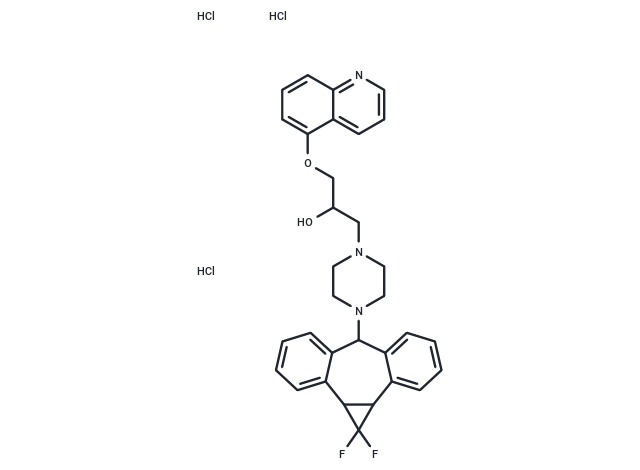Shopping Cart
- Remove All
 Your shopping cart is currently empty
Your shopping cart is currently empty

Zosuquidar trihydrochloride (LY-335979 trihydrochloride) is a potent modulator of P-glycoprotein-mediated multi-drug resistance with Ki of 60 nM. Phase 3.

| Pack Size | Price | Availability | Quantity |
|---|---|---|---|
| 1 mg | $30 | In Stock | |
| 5 mg | $64 | In Stock | |
| 10 mg | $90 | In Stock | |
| 25 mg | $177 | In Stock | |
| 50 mg | $263 | In Stock | |
| 100 mg | $396 | In Stock |
| Description | Zosuquidar trihydrochloride (LY-335979 trihydrochloride) is a potent modulator of P-glycoprotein-mediated multi-drug resistance with Ki of 60 nM. Phase 3. |
| Targets&IC50 | P-gp:60 nM(Ki) |
| In vitro | Zosuquidar competitively inhibits equilibrium binding of [3H]vinblastine to Pgp by blocking [3H]azidopine photoaffinity labeling of the Pgp in CEM/VLB100 plasma membranes. [1] Zosuquidar alone shows the cytotoxicity to drug-sensitive and MDR cell lines with IC50 ranging from 6 μM-16 μM and produces its ability to completely reverse the resistance of the oncolytics (vinblastine, doxorubicin, or etoposide) to the MDR cell lines P388/ADR, MCF7/ADR, 2780AD, or UCLA-P3.003VLB at concentration of 0.1 and 0.5 μM. [1] Zosuquidar significantly restores drug sensitivity in P-gp-expressing leukemia cell lines including K562/HHT40, K562/HHT90, K562/DOX and HL60/DNR, and enhances the cytotoxicity of anthracyclines (daunorubicin, idarubicin, mitoxantrone) and gemtuzumab ozogamicin (Mylotarg) in primary AML blasts with active P-gp. [2] A latest paper indicates that Zosuquidar completely inhibits apically directed transport of (Z)-endoxifen in the ABCB1-transduced cells. [3] |
| In vivo | Zosuquidar trihydrochloride is only moderately active as an inhibitor of P-gp at the blood-brain. Zosuquidar trihydrochloride at an oral dose of 25 mg/kg increases the brain concentrations by about 2.5-fold at 1 h and 5-fold at 24 h after paclitaxel administrationbarrier[4]. Zosuquidar enhances the brain uptake of nelfinavir in a dose-dependent manner. Brain tissue/plasma nelfinavir concentration ratios increase from 0.06±0.03 in the absence of zosuquidar administration and 0.09±0.02 between 2 and 6 h after a 2 mg/kg intravenous dose of zosuquidar to 0.85±0.19 after 6h and 1.58±0.67 after 20 mg/kg zosuquidar[5]. |
| Kinase Assay | ATPase Assay : P-Glycoprotein ATPase activity is measured by the liberation of inorganic phosphate from ATP. The assay is measured in a 96-well plate for 90 min at 37 °C. Membranes (8 μg-10 μg protein) are incubated in a total volume of 100 μL of buffer A containing 5 mM sodium azide, 1 mM ouabain, 1 mM EGTA, 3 mM ATP, an ATP regenerating system composed of 5 mM phosphoenolpyruvate, and 3.6 units/mL pyruvate kinase in the presence and absence of 1 mM sodium vanadate. Pgp-ATPase activity is defined as the vanadate-sensitive portion of the total ATPase activity. Plates are read 3 minutes after the addition of the detection solution. The absorbance is measured at 690 nm by a microtiter dish reader. A phosphate standard curve is used to calculate the μMol of phosphate formed. Samples are measured in triplicate. |
| Cell Research | Cell viability is determined using a modified 3-(4,5-dimethylthiazol-2-yl)-2,5-diphenyltetrazolium bromide dye reduction method. Cells are harvested during logarithmic growth phase, and seeded in 96-well plates. The cells are then cultured for 72 hours in the presence of oncolytics with or without modulators. MCF-7 and MCF-7/ADR cells are incubated 24 hours before the addition of the drug with and without the LY335979. LY335979 is prepared as 2 mM DMSO stocks and added to wells to give final concentrations ranging from 0.05 to 5 μM. After 72 hours, 20 μL of freshly prepared 3-(4,5-dimethylthiazol-2-yl)-2,5-diphenyltetrazolium bromide (5 mg/mL in Dulbecco's PBS) is added to each well and incubated for 4 hours in a 37 °C incubator containing 5% CO2. Cells are pelleted in a Sorvall RT6000B centrifuge, 70 μL of medium is carefully removed from each well, and 100 μL of 2-propanol/0.04 N HC1 is added. Cells are resuspended 5-10 times with a Multipipettor or until no particulate matter is visible. Plates are immediately read on a Titertek Multiskan MCC/340 microplate reader Flow Laboratories with a test wavelength of 570 nm and a reference wavelength of 630 nm. Controls are measured in quadruplicate and modulators are measured in duplicate. Cytotoxicity analyses are also performed using the CeliTiter 96 AQueous assay kit.(Only for Reference) |
| Alias | Zosuquidar 3HCl, Zosuquidar (LY335979) 3HCl, RS 33295-198 trihydrochloride, RS 33295-198 (D06387) 3HCl, LY-335979 trihydrochloride |
| Molecular Weight | 636.99 |
| Formula | C32H31F2N3O2·3HCl |
| Cas No. | 167465-36-3 |
| Smiles | Cl.Cl.Cl.OC(COc1cccc2ncccc12)CN1CCN(CC1)C1c2ccccc2C2C(c3ccccc13)C2(F)F |
| Relative Density. | no data available |
| Storage | Powder: -20°C for 3 years | In solvent: -80°C for 1 year | Shipping with blue ice. | ||||||||||||||||||||||||||||||
| Solubility Information | DMSO: 50 mg/mL (78.49 mM), Sonication is recommended. | ||||||||||||||||||||||||||||||
Solution Preparation Table | |||||||||||||||||||||||||||||||
DMSO
| |||||||||||||||||||||||||||||||

Copyright © 2015-2025 TargetMol Chemicals Inc. All Rights Reserved.